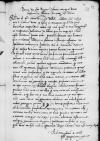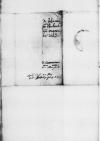List #494
Bona Sforza do Ioannes DANTISCUSCracow (Kraków), 1530-05-27
| odebrano Innsbruck, [1530]-06-16 Rękopiśmienne podstawy źródłowe:
Publikacje:
| ||||||
Tekst + aparat krytyczny + komentarz Zwykły tekst Tekst + komentarz Tekst + aparat krytyczny
Domino
Apud paper damaged⌈[Apud]Apud paper damaged⌉ sacram
Reverende in Christo Pater sincere nob paper damaged⌈[nob]nob paper damaged⌉is dilecte.
Redditae sunt nobis Tuae S(inceritatis) litterae datae 19 Aprilis ex
Interim Tuam S(inceritatem) monendam duximus, quod si
Super hoc sit S(inceritas) Tua bene cauta et, ut res ipsa nostris votis cedat, non gravatim elaboret, nam nihil gratius nobis contingere posset, quam quod hic bonus praefectus modernus ab huiusmodi praefectura excuteretur.
De
Reliqua committimus singulari prudentiae et fidei S(inceritatis) Tuae, quam bene et feliciter valere optamus.
Dat(ae) or Dat(um)⌈Dat(ae)Dat(ae) or Dat(um)⌉
Ad Mandatum
s(erenissimae) or s(acrae)⌈s(erenissimae)s(erenissimae) or s(acrae)⌉


 BCz, 3465, p. 30
BCz, 3465, p. 30